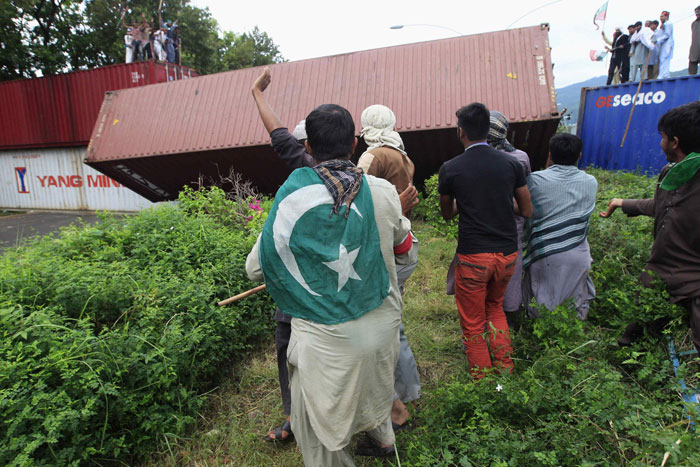An anti-government protester is draped in a national flag as he joins others in removing a container barricade during the Revolution March in Islamabad on Tuesday.
Reuters/Islamabad
Pakistani Prime Minister Nawaz Sharif chaired a joint session of parliament on Tuesday as a deepening crisis over violent protests demanding his resignation prompted fears of an army intervention.
Sharif enjoys a solid majority in parliament and by convening both houses he seeks to reaffirm that he is fully in control. His office said parliament would be in session all week to discuss the crisis.
"This is not a protest, a sit-in or a political gathering. This is a rebellion. It is a rebellion against state institutions. It is a rebellion against the state of Pakistan," Interior Minister Chaudhry Nisar told parliament.
"Clear guidance from this parliament would give strength to the police. ... They are not revolutionaries, they are intruders and terrorists," he said of the protesters.
Sharif, wearing traditional Pakistani clothes, made no remarks in parliament, taking notes and listening to speeches. A spokesman said Sharif might speak at the end of the session.
Pakistan has been in turmoil since mid-August when tens of thousands of protesters led by Imran Khan, a former hero cricket player, and outspoken cleric Tahir ul-Qadri flooded into the capital Islamabad refusing to leave unless Sharif resigns.
The protesters accuse the government of corruption and Sharif of rigging the election last year. He denies that and has refused to step down.
The demonstrations turned violent over the weekend as protesters armed with clubs and wearing gas masks to protect themselves against teargas tried to storm Sharif's residence. At least three people were killed and hundreds wounded.
But the capital was quiet on Tuesday, with no reports of violence. As members of parliament streamed into the assembly, a crowd of a few thousand protesters massed peacefully just outside in the so-called Red Zone - a central area where Sharif's office, ministries and many embassies are located.
But, raising the spectre of more confrontation, Defence Minister Khawaja Asif said the government was considering taking action including "selective use of force" and arrests.
The chaotic scenes in the usually orderly capital have unnerved a nation where power has often changed hands though military coups rather than elections, prompting speculation that the military was prepared to intervene again.
Few expect the army to actually seize power this time but many believe it is using the protracted crisis to weaken Sharif and consolidate exclusive control of key security and foreign policy issues such as relations with India and Afghanistan.
Highlighting divisions within opposition ranks, a former major ally of Khan's, Javed Hashmi, has said that Khan was effectively acting on the orders of the army, suggesting that the crisis was akin to a "soft coup".
Hashmi has fallen out with Khan and condemned protesters' attempt to storm Sharif's house over the weekend.
The army has denied it had anything to do with the protesters, saying it was entirely neutral and apolitical, but some in the government have long accused it of orchestrating the demonstrations to destabilise civilian rule.
On Monday, hundreds of people ransacked the state television headquarters, prompting the army to step in to clear and secure the building.

